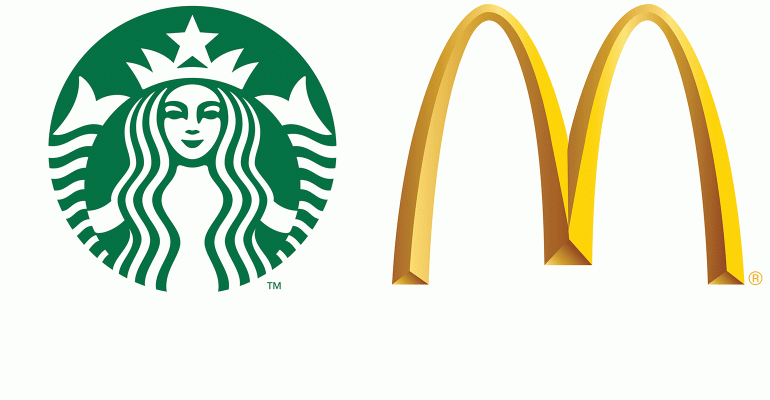Talk about a marriage of convenience.
Limited-service giants, McDonald’s and Starbucks — normally rivals in the breakfast category — are joining forces to save the planet. McDonald’s on Tuesday announced plans to join Starbucks in fast-tracking innovation that would lead to a recyclable or compostable cup that would suit the millions needed to serve their customers hot and cold beverages.
McDonald’s pledged to spend $5 million to support ideas through the NextGen Cup Challenge, a think tank for innovators looking to brainstorm the next generation fiber-based hot and cold cups. The challenge, overseen by Closed Loop Partners, will be open to supply chain leaders, innovators and anyone with promising solutions to create a recyclable cup at a large scale. Closed Loop Partners is an investment platform that invests in sustainable consumer goods. Its investors include many of the world’s largest consumer goods companies including Unilever, Johnson & Johnson, Pepsico, Walmart Foundation, Coca-Cola, P&G and Colgate-Palmolive.
Closed Loops estimates 600 billion paper and plastic cups are distributed worldwide. Of those, McDonald’s projects its distribution to represent about 3 percent.
In March, Starbucks committed $10 million to help Closed Loop Partners establish the NextGen Cup Challenge.
At the time, Starbucks said the challenge was a crucial first step “in the development of a global end-to-end solution that would allow cups around the world to be diverted from landfills and composted or given a second life as another cup, napkin or even a chair — anything that can use recycled material.”
The challenge to find the planet-friendly fast food cup kicks off in September. Innovators, entrepreneurs, industry experts, and recyclers will submit ideas for the next generation cup. Awardees will receive acceleration funding up to $1 million based on key milestones. Up to seven of the awardees will enter a six-month accelerator program to help scale their solutions, McDonald’s said.
So far more than 1,000 companies and individuals have shown interest in participating in the challenge.

Starbucks, which is starting to rollout strawless “sippy cup” style lids and alternative paper straws in some markets, said it is proud to work with McDonald’s to drive innovations that leads to scalable solutions for cup waste.
“A better cup will benefit the entire industry and we invite others to join us as we move these efforts forward,” Colleen Chapman, vice president of global social impact at Starbucks, said in a statement.
Since January, McDonald’s has accelerated its environmental goals as part of the Chicago-based chain’s Scale for Good initiative. Earlier this year, the burger giant previously set a goal of having all its packaging come from renewable and recycled sources by 2025. McDonald’s also set new emission-reduction goals to prevent 150 million metric tons of greenhouse gases from being released into the atmosphere by 2030. Like the next-gen cups, much of these goals cannot be obtained without the support of research in the lab and fields.
Some remodeled restaurants have already adopted new equipment to reduce their carbon footprints, including locations in Riverside, Calif., and Cary, N.C. The restaurants incorporate LED lighting; high-efficiency hand dryers, toilets and faucets; and low-spray valves. The environmentally-friendly upgrades are part of the chain’s goals to reduce energy and increase water efficiency 20 percent in restaurant designs by 2020.
Contact Nancy Luna at [email protected]
Follow her on Twitter: @FastFoodMaven





